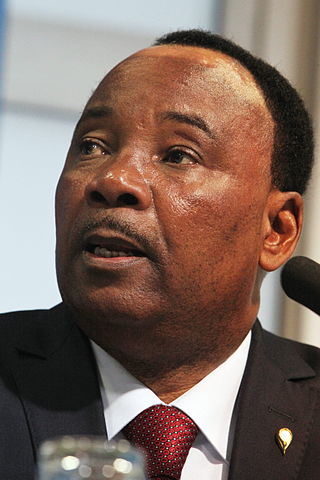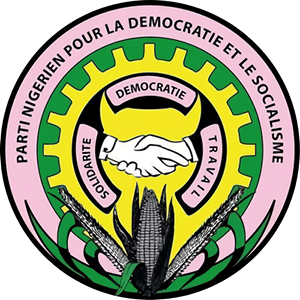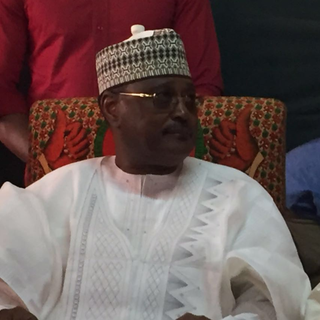
Politics of Niger takes place in a framework of a semi-presidential representative democratic republic, whereby the President of Niger is head of state and the Prime Minister of Niger head of government, and of a multi-party system. Executive power is exercised by the government. Legislative power is vested in both the government and the National Assembly.

Hama Amadou is a Nigerien politician who was Prime Minister of Niger from 1995 to 1996 and again from 2000 to 2007. He was also Secretary-General of the National Movement for the Development of Society (MNSD-Nassara) from 1991 to 2001 and President of the MNSD-Nassara from 2001 to 2009. Amadou is from the Kurtey, a Fula sub-group, and was raised in the Tillaberi Region, in the Niger River valley, north of Niamey.

Mamadou Tandja was a Nigerien politician who was President of Niger from 1999 to 2010. He was President of the National Movement for the Development of Society (MNSD) from 1991 to 1999 and unsuccessfully ran as the MNSD's presidential candidate in 1993 and 1996 before being elected to his first term in 1999. While serving as President of Niger, he was also Chairman of the Economic Community of West African States from 2005 to 2007.

Mahamane Ousmane is a Nigerien politician. Elected as the fourth President of Niger at 43 years old, he is the youngest elected president in Africa. He was also the first democratically elected president of his country, serving from 16 April 1993 until he was deposed in a military coup d'état on 27 January 1996. He has continued to run for president in each election since his ouster, and he was president of the National Assembly from December 1999 to May 2009. Since April 2020, he is the president of the Democratic and Republican Renewal, a major political party that is currently in opposition. RDR Tchanji formed an alliance with Ousmane's other political vehicle, MNRD Hankuri, on 16 December 2018.

Elections in Niger take place within the framework of a semi-presidential system. The President and National Assembly are elected by the public, with elections organised by the Independent National Electoral Commission (CENI).

Mahamadou Issoufou is a Nigerien politician who served as the president of Niger from 7 April 2011 to 2 April 2021. Issoufou was the prime minister of Niger from 1993 to 1994, president of the National Assembly from 1995 to 1996, and a candidate in each presidential election from 1993 to 2016. He led the Nigerien Party for Democracy and Socialism (PNDS-Tarayya), a social democratic party, from its foundation in 1990 until his election as president in 2011. During the presidency of Mamadou Tandja (1999–2010), Issoufou was the main opposition leader.

The National Movement for the Society of Development, also known as the National Movement for the Development of Society is a political party in Niger. Founded under the military government of the 1974–1990 period, it was the ruling party of Niger from 1989 to 1993 and again from 1999 until 2010, when a coup on 18 February 2010, by a military junta called the Supreme Council for the Restoration of Democracy (CSRD), ousted President Mamadou Tandja.

The Nigerien Alliance for Democracy and Progress is a political party in Niger. Moumouni Adamou Djermakoye led the party from its foundation in 1992 until his death in 2009.

The Nigerien Party for Democracy and Socialism is a political party in Niger. It is a broadly left-leaning party, part of the Socialist International; it came to power in 2011 following the election of the former long-time leader Mahamadou Issoufou. Mohamed Bazoum is the former president of the party and the former Secretary-General is Foumakoye Gado.
Hamid Algabid is a Nigerien politician and the President of the Rally for Democracy and Progress (RDP-Jama'a) party. A lawyer, banker, and technocrat, Algabid was an important figure in the regime of Seyni Kountché, serving as Prime Minister of Niger from 1983 to 1988. He was Secretary-General of the Organisation of the Islamic Conference (OIC) from 1989 to 1996, and since 1997 he has been President of the RDP-Jama'a. He was also President of the High Council of Territorial Collectivities (HCCT) until 2010.

Seyni Oumarou is a Nigerien politician who was Prime Minister of Niger from June 2007 to September 2009 and President of the National Assembly of Niger from November 2009 to February 2010. He is from the west of the country and is a member of the Djerma ethnic group. Since November 2008, he has been the President of the National Movement for the Development of Society (MNSD). He unsuccessfully stood as a presidential candidate in 2011, 2016 and 2021. After years as an opposition leader under President Mahamadou Issoufou, he was appointed to the post of High Representative of the President in October 2016.
Moumouni Adamou Djermakoye was a Nigerien politician and the President of the Nigerien Alliance for Democracy and Progress. He was an important minister during the regime of Seyni Kountché and subsequently served as Niger's Ambassador to the United States from 1988 to 1991; later, after founding the ANDP, he served as President of the National Assembly of Niger from 1993 to 1994. He was the ANDP's candidate in four presidential elections, beginning in 1993; he was also a deputy in the National Assembly from 1999 to 2009 and the President of the High Court of Justice from 2005 to 2009.
Habi Mahamadou Salissou is a Nigerien politician and a former Secretary-General of the centre-right National Movement for the Development of Society (MNSD). He served in the government of Niger as Minister of Secondary and Higher Education from 2001 to 2004 and as Minister of Trade and Industry from 2004 to 2007.
Albadé Abouba is a Nigerien politician who has been the Secretary-General of the National Movement for the Development of Society (MNSD-Nassara) since 2009. He served as Niger's Minister of the Interior from 2002 to 2004 and again from 2007 to 2010. Abouba also served as Prime Minister in an acting capacity for a brief period in September–October 2009. In August 2013 he served in the government of President Mahamadou Issoufou as Minister of State. He is now the president of the MPR-Jamhuriya, a political party that he created in October 2015. Since April 2016, he has served as Minister of State, Minister of Agriculture and livestock.

The Cabinet of Niger is made up of the appointed heads of Niger's government Ministries. Ministers are chosen from the elected members of the National Assembly of Niger. According to the Constitution of 18 July 1999 the Prime Minister of Niger proposes the membership of the Council of Ministers, and the President of Niger appoints the Ministers, which is then authorized by the National Assembly. The Council of ministers meets at the discretion of the President, advises him on policy, and implements the policies he formulates. The Council of Ministers is headed by the Prime Minister of Niger, whose name is put forward by the National Assembly, and accepted by the President. The Assembly may remove the Prime minister by a vote of no confidence.

The 2009–2010 Nigerien constitutional crisis occurred in Niger due to a political conflict between President Mamadou Tandja and judicial and legislative bodies regarding the Constitutional referendum that opponents claimed was an attempt to extend his mandate beyond the constitutional maximum. It was held on 4 August 2009 before a parliamentary election which was mandated to take place by 26 August 2009. The crisis eventually led to a coup d'état by military leaders who overthrew President Tandja and formed a ruling junta.

A constitutional referendum was held in Niger on 4 August 2009. The referendum proposed the dissolution of the Fifth Republic and the creation of the Sixth Republic under a fully presidential system of government, offering a yes or no vote on the suspension of the constitution and granting President Mamadou Tandja a three-year interim government, during which the constitution of the Sixth Republic would be formulated. On 20 June, the Constitutional Court declared the plan illegal, but Tandja subsequently assumed emergency powers and dissolved the Court. The events surrounding this election led to a constitutional crisis.
Amadou Ali Djibo dit Max is a Nigerien politician. He leads the Union of Independent Nigeriens (UNI) and was a minor candidate in the 1999 presidential election. He was a Deputy in the National Assembly of Niger from 2009 to 2010 and again since 2011.
A coup d'état occurred in Niger on 18 February 2010. Soldiers attacked the presidential palace in Niamey under weapons fire at midday and captured President Mamadou Tandja, who was chairing a government meeting at the time. Later in the day, the rebels announced on television the formation of the Supreme Council for the Restoration of Democracy (CSRD), headed by chef d'escadron Salou Djibo.

General elections were held in Niger on 31 January 2011 to elect the President and National Assembly, with a second round of the presidential elections on 12 March. The first round of the presidential elections was originally scheduled to be held on 3 January and the second round on 31 January, but was later postponed. The elections followed a military coup in February 2010 that ousted President Mamadou Tandja.











